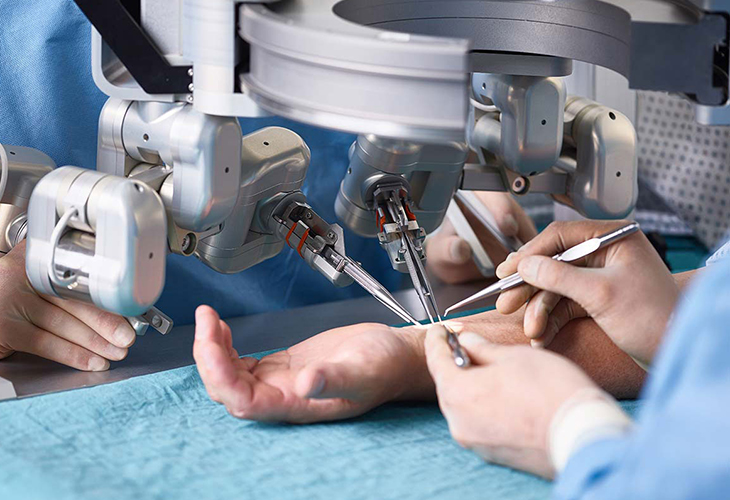The realm of modern medicine is continually enhanced by technological advancements, and one of the most significant breakthroughs has been the development and implementation of robotic surgery programs. These programs are revolutionizing how surgeries are performed, particularly in the fields of gastrointestinal and colorectal surgeries, offering unprecedented precision and significantly improved patient outcomes. This article delves into the essentials of robotic surgery, exploring the specialized robotic expertise required, and highlighting the pivotal role these programs play in contemporary healthcare.
The Rise of Robotic Surgery Programs
Robotic surgery represents a paradigm shift in surgical care, leveraging advanced robotic systems to perform complex procedures with greater accuracy and minimal invasiveness. A typical robotic surgery program integrates state-of-the-art robotic technology with skilled surgical teams to enhance surgical outcomes and patient recovery times. These programs often encourage patients and medical professionals to discover more about robotic surgery and its benefits.
Key Features of Robotic Surgery
- Enhanced Precision and Flexibility: Robotic systems provide surgeons with tools that extend their capability to manipulate surgical instruments with extraordinary precision. The robotic arms can twist and rotate beyond the natural capacity of the human hand, allowing for meticulous maneuvers within tight spaces.
- Improved Visualization: High-definition, three-dimensional imaging systems are integral to robotic surgery, offering surgeons comprehensive views of the surgical area. This clarity is crucial for complex gastrointestinal and colorectal surgeries where precise tissue differentiation is essential.
- Reduced Patient Trauma: The minimally invasive nature of robotic surgery means smaller incisions, which translate to less pain and reduced risk of infection for patients. This also leads to quicker recoveries and shorter hospital stays.
Discover More About Robotic Surgery Programs
To fully grasp the impact of robotic surgery, one must understand the various components that make up a comprehensive program:
- Robotic Expertise: Surgeons operating robotic systems require specialized training to develop the skills necessary to leverage this technology effectively. This expertise goes beyond traditional surgical training, encompassing the intricacies of robotic controls and real-time decision-making.
- Multidisciplinary Collaboration: A successful robotic surgery program relies on the seamless integration of efforts from various healthcare professionals, including surgeons, nurses, anesthesiologists, and technicians. Each team member plays a critical role in ensuring the smooth operation of the robotic system and the safety of the patient.
- Patient Education and Engagement: Educating patients about the benefits and risks associated with robotic surgery is vital. A well-informed patient can make better decisions regarding their healthcare options, and understanding the specifics of the procedure can alleviate anxiety and improve postoperative compliance.
Robotic Expertise in Gastrointestinal and Colorectal Surgeries
Robotic surgery has made significant inroads in the fields of gastrointestinal and colorectal surgeries, areas that particularly benefit from the advanced capabilities of robotic technology.
- Gastrointestinal Surgeries: Robotic systems are particularly beneficial for surgeries involving the stomach, liver, pancreas, and other abdominal organs. The enhanced dexterity and precision of robotic instruments allow for the careful dissection and suturing required in these complex areas, reducing complications and improving the surgical outcomes.
- Colorectal Surgeries: Colorectal surgeries often involve narrow and deep spaces that are difficult to access with traditional surgical techniques. Robotic surgery provides an advantage by improving access and visibility, thus allowing for more precise tumor removals and potentially better preservation of normal bowel function.
The Future of Robotic Surgery
The future of robotic surgery is incredibly promising, with ongoing innovations aimed at improving the technology’s capabilities and accessibility. Efforts are underway to integrate artificial intelligence (AI) with robotic systems, which could further enhance surgical precision and decision-making processes. Moreover, as more healthcare providers discover the advantages of robotic surgery programs, the adoption of this technology is expected to increase, making these advanced procedures available to a broader patient population.
Robotic surgery is at the forefront of technological integration in healthcare, offering a glimpse into the future of medicine where precision, efficiency, and patient safety are paramount. The continued development and expansion of robotic surgery programs, especially in specialties like gastrointestinal and colorectal surgeries, are not only enhancing surgical precision but also transforming patients’ lives by reducing recovery times and improving outcomes. As we continue to discover more about robotic surgery programs and their capabilities, the boundary of what is possible in medicine continues to expand, heralding a new era of surgical care.

